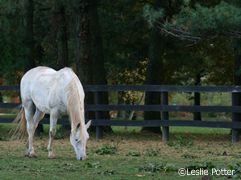 Q: How do I find a good retirement home for my horse? And if I have to send her far away, how can I be sure she’ll be taken care of?
Q: How do I find a good retirement home for my horse? And if I have to send her far away, how can I be sure she’ll be taken care of?
It’s a good idea to focus your search on non-profit retirement farms because you can be sure that any income goes directly to the care of the horses and facilities. There are also strict guidelines that an organization must meet and maintain to be a non-profit group, so this status is a good indication of its reputation. If the establishment is registered with GuideStar,–a site that provides detailed information about non-profits–you can view tax returns and financial statements and determine exactly how funds are spent. Any publicly supported retirement facility shouldn’t hesitate to give you copies of its financial statements. Another beneficial resource is the American Association of Equine Practitioners’ (AAEP) guidelines for rescues and retirement facilities (www.aaep.org).
When you’ve found a facility that you like, call and schedule a time to visit. Ask for a tour of the grounds and take note of the horses’ living arrangements and how they are managed. Be on the lookout for anything that could be hazardous to a horse’s health, for example, broken fences with exposed nails, stalls that don’t look like they are regularly cleaned, et cetera. Notice how the hay and feed is stored and check their quality. If possible, meet the staff that will be in charge of your horse’s care. For an added sense of security, bring along an experienced trainer, instructor or other horse person.
If you are unable to visit a facility because it’s too far away, ask to see pictures of it and to speak with references, particularly the veterinarian and farrier who manage the horses’ health care. You may be able to talk to other people who have retired their horses to the farm as well.
You should also ask to review any paperwork that you would be required to sign. Carefully read all documents and make sure you have a full understanding of them. Look for a clause that clearly defines the organization as a retirement facility and that your horse will stay there for the remainder of her life and cannot be sold or adopted out (some organizations may additionally offer horse rescue).
If it’s important that you be able to stay up to date on your horse once she has been moved to the retirement facility, ask the manager about the organization’s policies before you make your decision. You may be able to receive photos every now and then, or even visit your horse. Make sure this is stated in the legal forms you have to sign.
The process of finding a retirement farm for your horse can be time consuming, but the relief that comes with knowing you will be leaving your beloved equine friend in good hands is worth it.
Discuss retirement options in the HorseChannel forums >>
See other expert Q&As >>
Submit your Ask the Expert questions here >>







i never thought of retiring the horse just letting them stay with me untill they pass but just not working them. good info thanks
If at all possible, retired horses should stay in the care of their owner in my opinion. That’s the only way to be certain your faithful old plug will be treated as you think he should be and you’ll never have to worry about him ending up feeding lions in the wild animal park or at a kill auction.
Luckily my horses can retire at home. Can’t imagine paying retirement board on a horse.
I believe that my horses deserve to retire at home. They have provided many years of love and service and deserve my continued love and care. Older horses are invaluable to teaching manners to the younger generation and make good babysitters in pasture.
This may sound harsh but if I can’t provide retirement for my horse at my home I think I would prefer to have him put down. Unless I happen upon the perfect home the stress of leaving the place he has lived his entire life seems cruel.